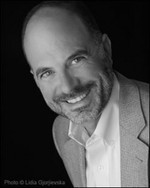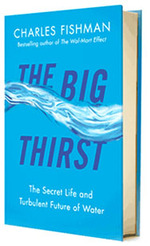The Big Thirst
Charles Fishman
Monday, 25 Feb 2013 at 8:00 pm – Great Hall, Memorial Union
Charles Fishman is author of The Big Thirst: The Secret Life and Turbulent Future of Water, which explores the politics, economics and culture of water and our complex relationship to this precious resource. As we've begun to reimagine our relationship to food, we must also rethink how we approach, manage and use water. Fishman shows that a host of advances are under way, from harvesting rainwater to innovations by companies such as IBM, GE, and Royal Caribbean that are making breakthroughs in water productivity. Charles Fishman is an award-winning investigative and magazine journalist who has spent the last twenty years trying to get inside, understand and explain important organizations, from NASA to Tupperware to Wal-Mart. Since 1996 he has been a senior writer at Fast Company magazine. He is also the author of The Walmart Effect. Prior to the Lecture, there will be a reception and poster display from 7 to 8 p.m. in the South Ballroom. University Symposium on Sustainability Keynote Speaker and part of the Symposium on Wildness, Wilderness & the Environmental Imagination and the World Affairs Series.No audio recording available.
The Big Thirst was voted one of Amazon's Best Books of 2011.
About the book:
The water coming out of your kitchen tap is four billion years old and might well have been sipped by a Tyrannosaurus rex. Rather than only three states of water - liquid, ice, and vapor - there is a fourth, molecular water, fused into rock 400 miles deep in the Earth, and that's where most of the planet's water is found. Unlike most precious resources, water cannot be used up; it can always be made clean enough again to drink-indeed, water can be made so clean that it's toxic. Water is the most vital substance in our lives but also more amazing and mysterious than we appreciate. As Charles Fishman brings vibrantly to life in this surprising and mind-changing narrative, water runs our world in a host of awe-inspiring ways, yet we take it completely for granted. But the era of easy water is over.
Bringing readers on a lively and fascinating journey - from the wet moons of Saturn to the water-obsessed hotels of Las Vegas, where dolphins swim in the desert, and from a rice farm in the parched Australian outback to a high-tech IBM plant that makes an exotic breed of pure water found nowhere in nature - Fishman vividly shows that we've already left behind a century-long golden age when water was thoughtlessly abundant, free, and safe and entered a new era of high-stakes water. In 2008, Atlanta came within ninety days of running entirely out of clean water. California is in a desperate battle to hold off a water catastrophe. And in the last five years Australia nearly ran out of water - and had to scramble to reinvent the country's entire water system. But as dramatic as the challenges are, the deeper truth Fishman reveals is that there is no good reason for us to be overtaken by a global water crisis. We have more than enough water. We just don't think about it, or use it, smartly.
"The Big Thirst" brilliantly explores our strange and complex relationship to water. We delight in watching waves roll in from the ocean; we take great comfort from sliding into a hot bath; and we will pay a thousand times the price of tap water to drink our preferred brand of the bottled version. We love water - but at the moment, we don't appreciate it or respect it. Just as we've begun to reimagine our relationship to food, a change that is driving the growth of the organic and local food movements, we must also rethink how we approach and use water. The good news is that we can. As Fishman shows, a host of advances are under way, from the simplicity of harvesting rainwater to the brilliant innovations devised by companies such as IBM, GE, and Royal Caribbean that are making impressive breakthroughs in water productivity. Knowing what to do is not the problem. Ultimately, the hardest part is changing our water consciousness.
As Charles Fishman writes, "Many civilizations have been crippled or destroyed by an inability to understand water or manage it. We have a huge advantage over the generations of people who have come before us, because we can understand water and we can use it smartly." "The Big Thirst" will forever change the way we think about water, about our essential relationship to it, and about the creativity we can bring to ensuring that we'll always have plenty of it.
More about the author:
As a reporter, Charles Fishman has tried to get inside organizations, both familiar and secret, and explain how they work.
In the course of reporting about water to write "The Big Thirst," Fishman has stood at the bottom of a half-million-gallon sewage tank, sampled water directly from the springs in San Pellegrino, Italy, and Poland Spring, Maine, and carried water on his head for 3 km with a group of Indian villagers.
Fishman's previous book, the New York Times bestseller "The Wal-Mart Effect," was the first to crack open Wal-Mart's wall of secrecy, and has become the standard for understanding Wal-Mart's impact on our economy and on how we live. The Economist named it a "book of the year."
Fishman is a former metro and national reporter for the Washington Post, and was a reporter and editor at the Orlando Sentinel and the News & Observer in Raleigh, NC. He has won numerous awards, including three times receiving UCLA's Gerald Loeb Award, the most prestigious award in business journalism.
Fishman grew up in Miami, Florida, and went to Harvard.
Cosponsored By:
- College of Agriculture & Life Sciences
- College of Engineering
- College of Liberal Arts & Sciences
- Humanities Iowa
- Iowa Water Center
- MFA Program in Creative Writing & Environment
- Office of Sustainability
- World Affairs
- Committee on Lectures (funded by Student Government)
Stay for the entire event, including the brief question-and-answer session that follows the formal presentation. Most events run 75 minutes.
Sign-ins are after the event concludes. For lectures in the Memorial Union, go to the information desk in the Main Lounge. In other academic buildings, look for signage outside the auditorium.
Lecture Etiquette
- Stay for the entire lecture and the brief audience Q&A. If a student needs to leave early, he or she should sit near the back and exit discreetly.
- Do not bring food or uncovered drinks into the lecture.
- Check with Lectures staff before taking photographs or recording any portion of the event. There are often restrictions. Cell phones, tablets and laptops may be used to take notes or for class assignments.
- Keep questions or comments brief and concise to allow as many as possible.




